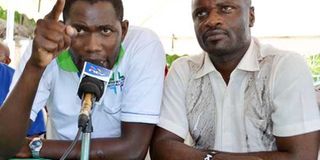Breaking News: At least 10 feared to have drowned in Makueni river
Doctors reject new pay offer pushing ailing health sector into deeper crisis

Kenya Medical Practitioners, Pharmacists and Dentists Union Secretary-General Ouma Oluga (left), with National Chairman Samuel Oroko, addresses journalists in Mombasa on December 31, 2016. The medics have rejected a 40 per cent pay rise offered by President Uhuru Kenyatta. FILE PHOTO | KEVIN ODIT | NATION MEDIA GROUP
What you need to know:
- The doctors called a press conference on Friday at which they announced that their work boycott was still on.
- The medics said the 40 per cent pay rise the President had offered had been presented to them before by the government.
- The meeting came after doctors called on the President to exercise his executive authority and end the strike.
- Health Cabinet Secretary Cleopa Mailu said the agreement was not aligned with the public service guidelines on remuneration.
Striking doctors on Friday rejected a 40 per cent pay rise offered by President Uhuru Kenyatta on Wednesday and vowed not to go back to work, dashing hopes that public health services that have been paralysed for the last one month would resume.
The doctors, who downed their tools on December 5, crippling operations at the public hospitals countrywide, called a press conference on Friday in which they announced that their work boycott was still on because what the President had offered had been presented to them before by the government.
Only the full implementation of a collective bargaining agreement (CBA) signed in 2013 and which includes a 100 per cent pay increase would get them to resume work, Kenya Medical Practitioners, Pharmacists and Dentists’ Union (KMPDU) Secretary-General Ouma Oluga said at the Railways Club in Nairobi.
Dr Oluga said he had consulted union members and that they had “politely rejected" the offered higher allowances but "preferred implementation of the CBA”.
The President’s offer, presented in Mombasa on January 4 in a meeting attended by KMPDU officials, the Health ministry and the Treasury, included an array of allowances across various job groups that would have raised the salaries of the least-paid doctor by 40 per cent.
END STRIKE
Had they taken the offer, the least-paid doctor would have taken home a monthly salary of Sh196,989, up from the current Sh140,244.
The proposal had also included allowances for doctors in various job groups. The meeting came after doctors called on the President to exercise his executive authority and end the strike.
On the other hand, the CBA that the doctors are fighting for contains a 100 per cent salary increase for the least-paid doctor, about 75 per cent for the highest-paid, bearable working conditions and other human resource concerns.
Responding to the doctors’ position, the government said the CBA could not be implemented in its current state.
Health Cabinet Secretary Cleopa Mailu said the agreement was not aligned with the public service guidelines on remuneration.
“The government has been considerate towards the plight of doctors but what their union is seeking is not within the frameworks of the public service,” said Dr Mailu at the Treasury offices.
Public Service Commission head Margaret Kobia said the CBA had ignored the fact that county governments are the employers of about 80 per cent of the doctors.
DOCTORS TOSSED AROUND
She said the 40 per cent pay rise offered by the government was a significant raise that the doctors should not have turned down.
One of a series of tweets on the KMPDU's Twitter account on Friday read : “The government’s offer fails to capture the salary structure that was agreed collectively between us and the government.”
Today marks a month and three days since the national strike began, with more than 7,000 public hospital doctors in staying away from work.
Tom Kwasa, a doctor for more than four decades, described the boycott as “possibly the worst by doctors in Kenya”, as it threatens other processes that rely on public hospitals such as the training of medical students.
On Friday, Kenya’s two referral hospitals that also act as training centres for medical students — Kenyatta National Hospital and Moi Teaching and Referral Hospital in Eldoret — remain closed because the consultants who train the students on clinical practice are on strike.
The doctors said they had been tossed around from one arm of the government to another since the CBA was signed in June 2013.
Sultani Matendechero, who was KMPDU's secretary-general when the agreement was signed, said the deal was supposed to have taken effect in July 2013.






